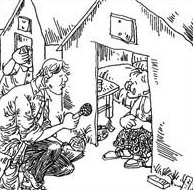
A month ago today at 2:28 pm, the Wenchuan earthquake started to rip apart villages, towns and cities in Sichuan, the land of abundance, leisure and natural splendor, causing a tremendous loss of lives as well as pain and agony throughout the country.
Since then, several of my colleagues, with the youngest who joined the paper just six months ago and the oldest in his mid-50s, have worked in the epicenter areas to report on the great tragedy, the massive rescue and relief work.
I envy them as they have covered the most devastating natural disaster since New China's founding with an openness, promptness and courage that has been unprecedented in modern Chinese journalism.
Just on Tuesday, two of my young colleagues went up the hills overlooking Beichuan county seat, witnessing the flood water from the Tangjiashan quake lake rushing downstream.
On the third day after the quake, they trekked their way into Beichuan, which was almost flattened when the earth's crust ruptured. They saw and shared with our readers not only the devastation but also the daring of the rescue workers and local survivors who were trying to save as many lives as possible.
Cheng Weidong, a journalist friend of mine and of the age of my young colleagues' fathers, began his nearly 1,000 kilometer long drive into the epicenter with his two colleagues a week after the disaster struck. The road was treacherous as the quake sliced the mountains and roads; while landslides could occur at any time and any place along the way as a result of countless aftershocks.
But they embarked on the trip anyway, because this is his job as a journalist, he told me. With his daring, his team arrived in some of the remote villages even before the much-needed relief materials, such as water and tents, arrived at those places.

But the most precious lessons I learn from them are their sympathy. We have been quite disgusted by a number of our colleagues who seem to be carried away with their profession as journalists. They are seen pestering or even bombarding the victims - many of them children or even toddlers - with impertinent questions.
Another young colleague of mine told me that she was angry at one TV reporter, at the Jiuzhou Stadium in Mianyang, where thousands of displaced people still have their shelter. Without even a slight gesture of sympathy, the reporter pursued a teenager there, fired the question "Did any member of your family die?" and followed it with "Is your home ravaged" when the teenager said no one in his family died in the quake.
"These questions are putting salt into the wounds of the victims," my colleague said.
Cheng is more emotional because he had traveled the same villages and towns only five months earlier. During the earlier trip, he took a photo of a four-generation family in Luobu Village, a Qiang ethnic minority village whose history goes back centuries.
The patriarch was 98, still healthy and energetic.
When Cheng arrived at the village in the last week of May, he discovered almost all the houses in the village, built of mud and rammed earth, had collapsed. He was also told the family patriarch died in the quake. He said he thought of looking for that family's survivors and decided against it. "I didn't want to rip open their wounds again," he explained.
But some may argue how they could gather people's stories if they are reluctant to have the victims open their mouths.
They observe; they start with easier questions; and they even help out as volunteers. And above all, they do their job with compassion for the victims - a quality and an essential clause in the journalistic code of ethics.
E-mail: lixing@chinadaily.com.cn

